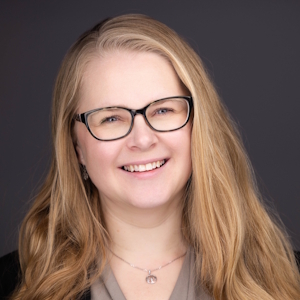More women in HPC, better results for all
More women in HPC, better results for all
When Karina Pešatová returned from maternity leave in 2021, she noticed how few women were visible in high-performance computing (HPC). Rather than accept the status quo, she took action, founding the Central European Chapter of Women in HPC in 2024, uniting colleagues from four countries. In this interview, she explains how conferences, comics, and community can foster diversity in HPC - and why it’s worth making the extra effort to put women on stage.
Karina, what are the core challenges women face in HPC?
One of the most significant problems is visibility. There simply aren’t enough women in HPC, and that has a ripple effect. When young girls don’t see women in these roles – at conferences, in leadership positions, or in the media – they get the impression that this field isn’t for them, or that it’s nearly impossible to succeed in it as a woman. The lack of role models can discourage them from even trying.
And it’s not just about representation for its own sake – it affects the quality of the science we do. When research teams aren’t diverse, when AI models are trained on biased or non-inclusive datasets, we risk creating tools and systems that only work for part of the population. Without women’s perspectives, we’re not building truly effective or inclusive solutions. That’s why it’s so important to have more women involved – not only in using HPC, but in shaping its future. Different perspectives lead to better research, better design, and ultimately better results for everyone.

What motivated you to found the Central European Chapter of Women in HPC (WHPC)?
It was not like one moment, but more like a long process for me. I joined the HPC world in 2012 in Czechia. Though I knew Women in HPC existed, I was not much involved back then. Then I went on maternity leave in 2019. When I returned in 2021, I began to engage more deeply in gender balance and inclusion efforts. That experience opened my eyes even more to the underrepresentation of women in this field and how much work remains to be done.
Around that time, I discovered that the Czech Republic ranks among the worst in the EU in terms of the number of women in ICT. So I started thinking about how we could improve the situation. After ISC 24*, I asked our director, Vít Vondrák, about our involvement in Women in HPC, and he was very supportive of the idea. Since the Czech Republic is relatively small, I reached out to colleagues in Austria, Slovenia, and Poland to ask if they’d be interested in collaborating. They all said yes. So in 2024, we officially founded the Central European Chapter of Women in HPC. This year, we have expanded to include Slovakia and Hungary.
What is your aim with Women in HPC?
Coming from a communications background, I see my role as making sure that women in HPC are visible – that their work, contributions, and stories are being told. Visibility is powerful. If people don’t see women on stage, in leadership roles, or as part of expert panels, they unconsciously assume that they don’t belong there. So I try my best to change that narrative and open up space where women are seen and heard.
At the same time, I want to support the next generation of HPC professionals – especially young women and students – as they begin to navigate these technical communities. It can be hard to find your place or feel like you belong, especially in such a specialised field. Through Women in HPC, we aim to build a supportive network where people lift each other instead of competing. We celebrate each other’s successes, share opportunities, and talk openly about the challenges we face. That kind of community can make a big difference.
“
Through Women in HPC, we aim to build a supportive network where people lift each other instead of competing. We celebrate each other’s successes, share opportunities, and talk openly about the challenges we face.
„
If a young woman approaches you and is thinking about a STEM career or even a career in HPC, what would be your advice?
Don’t be afraid. Don’t compare yourself to your male peers – you have your own perspective and strengths, and those can be a huge asset. If you’re passionate about this field, go for it.
The HPC community is very welcoming. I’ve met so many brilliant, humble people who are happy to help if they see you’re eager to learn. And many of our male colleagues are incredibly supportive of women in the field. I have to mention Brian Wylie from Jülich Supercomputing Centre here as he played a key role in getting me more involved in the WHPC community.
“
We need real support, not just nice words or checkboxes in proposals. Gender balance is often a formal requirement in projects, but there’s no funding for the measures that could actually create change.
„
What are the things Women in HPC as an initiative needs right now?
We need real support, not just nice words or checkboxes in proposals. Gender balance is often a formal requirement in projects, but there’s no funding for the measures that could actually create change. For example, when recruiting students for the educational programme EUMaster4HPC, we’re evaluated on gender balance, but we’re already working with a heavily male-dominated applicant pool. The girls simply aren’t there, and we can’t fix that overnight without discriminating against the boys.
That’s why we need to start much earlier – at the primary or even preschool level. By the time students reach university, many girls have already opted out of STEM because they never saw themselves represented. If we want real change, it has to start with early education and visibility. We have a project called Superheroes 4 Science. It’s an outreach initiative that uses comics and storytelling to introduce children to HPC, AI, and quantum computing – making these complex topics fun, accessible, and inclusive. I created the storyboards for two of the comics myself. When I was writing them, after having five or six panels already done, I realised that my hero was once again a boy. So I went back and changed it to a girl. It’s important to give girls role models and show them they can pursue any career they want.
Is there anything, except for funding, that men and women can contribute to the success of Women in HPC?
If you’re a man or a woman working in HPC in Central Europe, we’d love to have you involved. And if you’re in a decision-making position – say, on a conference committee – please make an extra effort to find qualified women to speak. Don’t just settle for the usual suspects. If you’re having trouble finding someone, get in touch with us. We’ll help you connect with the right person.
With WHPC you also celebrate the achievements of your female colleagues. What was your most recent personal success?
Founding the Central European Chapter of Women in HPC has been one of the most meaningful milestones of my career. It brought together like-minded colleagues across the region and gave real structure to years of informal efforts around inclusion, visibility, and support for women in our field.
These efforts culminated at ISC 2025, where I had the honour of co-organising several Birds-of-a-Feather (BoF) sessions**. One focused on building a sustainable HPC training ecosystem in Europe, and another addressed future career and education paths. I also co-organised the Super(computing)heroes BoF session, which featured a panel of inspiring women in HPC sharing their journeys, challenges, and motivations. It was a powerful, authentic conversation that resonated deeply with the audience and reinforced the importance of visible role models.
“
I also co-organised the Super(computing)heroes BoF session, which featured a panel of inspiring women in HPC sharing their journeys, challenges, and motivations. It was a powerful, authentic conversation that resonated deeply with the audience and reinforced the importance of visible role models.
„
In addition, I was invited to speak on the 40 Years of ISC anniversary panel, contributing to the segment on inclusion and future talents. It was an honour to reflect on how far the community has come – and what still needs to change to create a more welcoming and diverse future. And one of my proudest moments: my young colleague and mentee Lucie Kavka presented a poster on our Superheroes 4 Science project. Seeing her confidently present our work to the international community was a true highlight.
How more diversity in high-performance computing benefits everyone
Supercomputing plays a central role in modern research. When people with different perspectives work together at high-performance computing centres, this diversity has far-reaching effects: more inclusive product designs, better data and more representative science. Diverse teams usually develop solutions that serve the majority of the population – not just half of it.
About Karina Pešatová
Karina Pešatová, MBA, leads the Training and Education Department at IT4Innovations National Supercomputing Center in the Czech Republic. She joined IT4Innovations in 2012 as part of the communications department and gradually advanced to become its head. After returning from maternity leave in 2021, she was tasked with building the Training and Education Department, where she now focuses on developing inclusive and impactful educational activities in high-performance computing (HPC), artificial intelligence (AI), and quantum computing. Within just 15 months, she quadrupled the number of training events hosted by IT4Innovations.
Karina serves as the training champion for EuroCC Czechia and contributes to major European initiatives such as EVITA (EuroHPC Virtual Training Academy) and EUMaster4HPC, where she helps build a coordinated and accessible training ecosystem across Europe.

She is the founder and current leader of the Central European Chapter of Women in HPC, working to improve gender balance, visibility, and regional collaboration in the field. Her outreach efforts include the Superheroes 4 Science project, which uses comics, games, and storytelling to introduce children to advanced computing – proving that HPC can be creative, fun, and open to everyone.
Join WHPC and connect with women in ICT
To become a member of the Central European Chapter of WHPC, apply here. Tick the box “Central European (incl. centres in the Czech Republic, Poland, Austria, Slovenia, Slovakia, Hungary)” to become a member of the Central European Chapter.
If you have any questions about the Central European Network of WHPC, feel free to contact the team at ce.whpc@gmail.com.
One of WHPC’s most valuable tools for supporting women’s careers is the free mentoring programme, which runs two to three times a year. Register here for one of the next available spots.
WHPC on LinkedIn (following on LinkedIn is not a membership)
* ISC High Performance is a major international conference on supercomputing.
** Birds-of-a-Feather (BoF) sessions are informal gatherings at conferences and events where people with shared interests can meet to discuss specific topics, exchange ideas, and build a network.